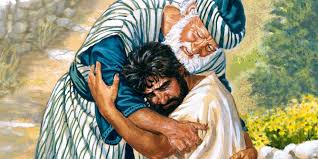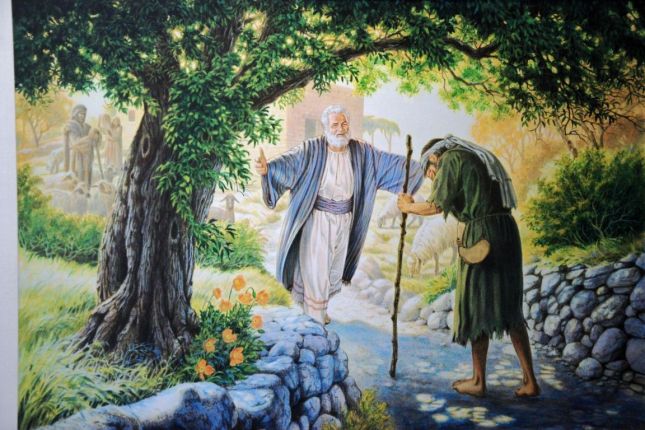THE LOVING AND MERCIFUL FATHER
THE LOVING AND MERCIFUL FATHER
(A biblical reflection on the 4th Sunday of Lent [Year C] – March 6, 2016)
Gospel Reading: Luke 15:1-3,11-32
First Reading: Joshua 5:9-12; Psalms: Psalm 34:2-7; Second Reading: 2 Corinthians 5:17-21
Scripture Text
Now the tax collectors and sinners were all drawing near to hear Him. And the Pharisees and the scribes murmured, saying, “This man receives sinners and eats with them.”
So He told them this parable: “There was a man who had two sons; and the younger of them said to his father, ‘Father, give me the share of property that falls to me.’ And he divided his living between them. Not many days later, the younger son gathered all he had and took his journey into a far country, and there he squandered his property in loose living. And when he had spent everything, a great famine arose in that country, and he began to be in want. So he went and joined himself to one of the citizens of that country, who sent him into his fields to feed swine. And he would gladly have fed on the pods that the swine ate; and no one gave him anything. But when he came to himself he said, ‘How many of my father’s hired servants have bread enough and to spare, but I perish here with hunger! I will arise and go to my father, and I will say to him, “Father, I have sinned against heaven and before you; I am no longer worthy to be called your son; treat me as one of your hired servants.”’ And he arose and came to his father. But while he was yet at a distance, his father saw him and had compassion, and ran and embraced him and kissed him. And the son said to him, ‘Father, I have sinned against heaven and before you; I am no longer worthy to be called your son.’ But the father said to his servants, ‘Bring quickly the best robe, and put it on him; and put a ring on his hand, and shoes on his feet; and bring the fatted calf and kill it, and let us eat and make merry; for this my son was dead, and is alive again; he was lost, and is found.’ And they began to make merry.
“Now his elder son was in the field; and as he came and drew near to the house, he heasrd music and dancing. And he called one of the servants and asked what this meant. And he said to him, ‘Your brother has come, and your father has killed the fatted calf, because he has received him safe and sound.’ But he was angry and refused to go in. His father came out and entreated him, but he answered his father, ‘Lo, these many years I have served you, and I never disobeyed your command; yet you never gave me a kid goat, that I might make merry with my friends. But when this son of yours came, who has devoured your living with harlots, you killed for him the fatted calf!’ and he said to him, ‘Son, you are always with me, and all that is mine is yours. It was fitting to make merry and be glad, for this your brother was dead, and is alive; he was lost, and is found.’” (Luke 15:1-3,11-32 RSV)
The magnificent story we have just heard in the Gospel has long been known as the parable of the prodigal son. Actually the story was intended to focus on the father, rather than on either of the two sons in the story, and could perhaps more accurately be termed the parable of the loving father.
The background of the story is that the scribes and the Pharisees were upset to see Jesus associating with known sinners. Jesus told the story in order to bring out the idea that God willed the salvation of sinners and was eager to forgive their sins. He wished to impress on His hearers the truth that God is a loving and understanding Father.
 Jesus, however, painted such a true-to-life picture of the younger son that down through the centuries it is this picture that has caught the attention of most people. It is typical for a young person to want to be independent, to be free of parental control, to go out on his own, to see and do and experience all those things that were never a part of home life. The results of this leave-taking are also typical: discovering the value of a dollar, the need for true friends, the importance of a sense of belonging. That is jolting, disturbing experience.
Jesus, however, painted such a true-to-life picture of the younger son that down through the centuries it is this picture that has caught the attention of most people. It is typical for a young person to want to be independent, to be free of parental control, to go out on his own, to see and do and experience all those things that were never a part of home life. The results of this leave-taking are also typical: discovering the value of a dollar, the need for true friends, the importance of a sense of belonging. That is jolting, disturbing experience.And we know how the young man felt. We know what it means to be alone, to feel guilty, to be overcome with fear. After he had spent his money, all his shallow, good-time friends deserted him. He was left alone with his misery, his guilt and his fear. He began to realize what a mistake he had made in leaving his father.
The older brother in the story is also a person we can understand. When he returned from work in father’s fields, he was infuriated to discover a party going on for his “worthless” brother. At first sight it looks as though he had been cheated, but there is really little excuse for his jealousy. He should have been happy that his little brother had come to his senses. There is something revealing in his protest to his father: “Lo, these many years I have served you, and I never disobeyed your command; yet you never gave me a kid goat, that I might make merry with my friends” (Luke 15:29). He considered working for his father a form of slavery and his obedience was mercenary, not filial. Apparently he did everything with the expectation eventually of some great reward from his father. His work was motivated by selfishness, not love. The older son represents the scribes and Pharisees who complained about our Lord’s merciful treatment of sinners.
No matter what about the two sons, the story was really intended to focus on the father in order to reveal something about God. When the younger boy brought up the idea of leaving home, the father was in turmoil. He knew the dangers that lay ahead for his son. And yet he equally understood the young man’s need and right to be free. The father rightly refused to dominate or control his son at this time in his life because he realized that love to be true must be freely given, that it cannot be forced. And so when the boy insisted on his freedom, the father in loving kindness sadly agreed.
All the while the boy was gone the father was hoping that the experience would teach him a sense of real values, as apparently his fatherly words had not. Every day he went to the top of the hill and scanned the road as far as he could see the hope that he would catch sight of the boy returning. One day his hope fulfilled. He rushed to meet his son, threw his arms around him, and with an impetuosity that revealed his deep emotion he would not even let him complete the little speech begging for pardon, which he had so carefully memorized. The boy knew that he deserved to hear his father say, “You were determined to make a fool of yourself, and you succeeded brilliantly. I will have nothing more to do with you.” Instead he was overcome with the loving reception he received.
What a great love the father had for this young son. But his love is really no less for the older son. He refused to be forced into taking sides with the one brother against the other. Though each had failed in his own way, the father never stopped loving them both. With all their shortcomings, he regarded them both as his sons.
In some ways we are like the younger son, and other ways we are like the older son. But wherever we stand, Jesus wants us to know that God – our heavenly Father – gives us human freedom because He wants a love that is freely given, not forced. Jesus also want us to know that after even the most stupid of mistakes and tragic of sins, God will be looking for us with open arms to take us back as His children. Our God is indeed a loving and understanding Father.
Short Prayer: Heavenly Father, thank You for Your unconditional love and Your everlasting forgiveness. Help me to run to You and fall into Your loving embrace every day. Amen.
Jakarta, 3rd of March 2016
A Christian Pilgrim
Leave a comment
Posted by achristianpilgrim on March 5, 2016 in PARABLES OF JESUS
